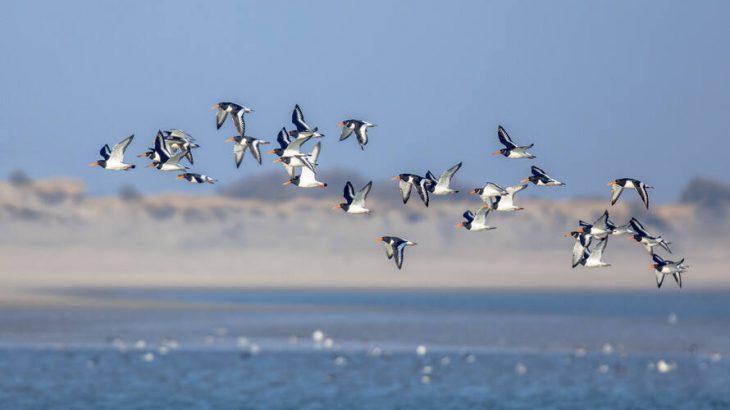Ossudu Lake Bird Sanctuary is situated about 10 km from Puducherry town and has been recognized as one of the most important wetlands of Asia by the International Union for Conservation of Nature and Natural Resources. The lake acts as the single largest catchment of freshwater in Puducherry. As per the Bombay Natural Bird History Society, it is one of the most important bird “natural” habitats. Ossudu lake attracts over 20,000 birds of 40 rare species from all parts of the world every year, and the season is from August to November. Greater Flamingo from Great Rann of Kutch is one of the primary guests of this migratory season. The different species of birds including Spot-Billed Pelicans, Painted Stork, Spoon-Billed Ducks, Whistling Ducks, and Black-Headed Ibis are regular visitors to this place. These birds use the patches of greenery to rest and refuel in the middle of their journey between winter and breeding sites. Within migration, land birds spend up to 90% of their time resting and regaining energy at stopover sites, making habitat a key component for their migration to a particular destination.
Grow-Trees’ tree plantation project, Trees for Migratory Birds – Ossudu, Puducherry with a tree plantation target of 7,500 trees was supported by Geocycle India for improving the nesting grounds of migratory birds in 3 different regions of Puducherry – namely, Oussudu Lake Bird Sanctuary, fringes of the Bahour Lake and Oorani community land.
As a company striving for zero waste future by closing resource cycles, Geocycle India is also the leading provider of industrial, agricultural and municipal waste management services worldwide. Through the application of proven technology of ‘co-processing’, they are utilizing existing facilities in the cement industry to resolve waste challenges sustainably. This enables them to recover energy and recycle materials from waste. They strive to contribute towards a regenerative, circular economy that closes resource cycles. Geocycle India manages more than 10 million tons of waste annually, thus making a tangible contribution to bringing society a step closer to a zero-waste future. Their initiative to plant trees in rural lands to improve animal habitat and the overall ecosystem has proved to be one of the bridging stones in their vision. This project, through the reclamation of degraded lands, as primary forests will be aiding in the protection of the natural habitat of the migratory birds and other wildlife prominent in the state of Puducherry while strengthening the forest-based livelihood opportunities for local communities and financially uplifting the local rural communities.
Geocycle India has been able to successfully create shared value through the improvement of the natural habitat of birds’ and the rural economy in one hand, and fulfilling their long term social responsibility in the other.
But, how have they created this natural habitat for the migratory birds?
Dense forest cover acts as a prerequisite for migratory birds to survive. Different birds have different preferences for trees to build their nests and shelters upon. Plantation efforts by Grow-Trees.com supported by Geocycle India sought to plant those tree species and types which are preferred for nesting by migratory birds. Birds use these patches of greenery to rest and refuel in the middle of their journey between winter and breeding sites. Within migration, land birds spend up to 90% of their time resting and regaining energy at stopover sites, making habitat a key component
According to a study done by Swiss Federal Institute for Forest, Snow and Landscape Research with the Institute of Ecology and Evolution at the University of Bern, 13 species of birds will be found when no trees are present, whereas 20 species are in place when tree cover increases to 45 per cent. The researchers of this study determined that ‘the positive effect of trees outweighs the negative effect of sealed area and buildings. Therefore, increasing tree cover is a more promising and efficient measure to enhance bird species richness and diversity. Additionally, birds need rich natural habitat to feed young birds with insects found in a balanced ecosystem.
Community Engagement
Grow-Trees.com believes in empowering local rural communities from end-to-end and therefore, involves them, especially women in all the tree plantation activities, starting from pit digging to sapling plantation. The plantation drive also engaged and mobilized school children to instil climate awareness in them. Such forest-based economies provide socio-economic development and in the long run, encourage sustainable development for the rural dwellers. In fact, Geocycle India has created a 360-degree impact through the plantation of ecologically valued trees – native trees, namely the Indian Oak (Barringtonia acutangula), Babul (Acacia nilotica), Black Plum (Syzygium cumini), Neem (Azadirachta indica), and Amaltas (Cassia fistula), empowerment of local communities, creation of a healthy ecosystem for wildlife and eradication of climate change. These trees were carefully chosen to ensure their highest survival and carbon sequestration capabilities. Through this technique, each patch of habitat became a part of a collective effort to nurture and sustain the living landscape for birds and other animals. As a result, in this project site, trees have considerably improved the coastal habitat of the region through their decarbonizing effects. The strong roots of these native trees have provided adequate green cover to avoid the frequent floods conditions in the region and encouraged more birds to migrate in the breeding season.
Crucially, through this initiative, Geocycle India has decarbonized the atmosphere through the magical power of trees – their ability to sequester carbon from the atmosphere. With every tree, Geocycle India is offsetting a massive amount of ~20 kgs of carbon upon maturity.
